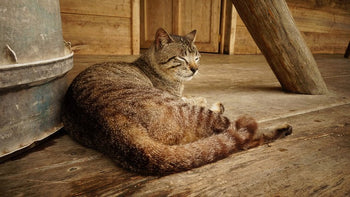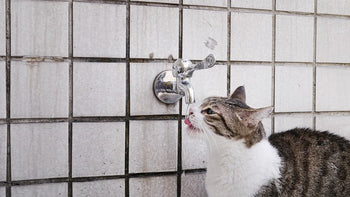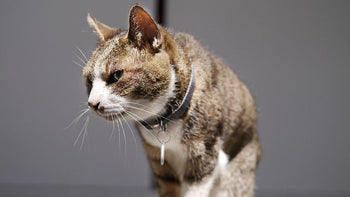Cats are beloved companions, and as cat owners, we all want our furry friends to live long, healthy lives. But how long do cats live? The average lifespan of a cat can vary depending on many factors, such as whether the cat lives indoors or outdoors, its breed, diet, and healthcare. In this article, we’ll answer common questions about cat lifespan, explore the different life stages of cats, and discuss what influences their longevity.

How Long Do Cats Live?
The average lifespan of a housecat is typically between 12 and 15 years, but many cats live beyond that. Some cats, especially those kept indoors, can live well into their late teens or even early 20s. This varies depending on several factors, including lifestyle, genetics, and the level of care provided.
- Indoor cat lifespan: Indoor cats generally live longer due to fewer risks like traffic accidents, predators, and diseases. The average life span of an indoor cat is around 15-20 years.
- Outdoor cats: Cats that spend time outdoors typically have a shorter lifespan of 5-10 years, due to increased exposure to risks.
- What is a cat's lifespan? On average, the lifespan for cats ranges from 12 to 20 years depending on care and environment.
Do neutered cats live longer?
The lifespan of cats can be influenced by whether they are spayed or neutered. In fact, cats that have been spayed or neutered tend to live longer than those that haven't. This is because the procedure reduces the risk of certain health issues, such as reproductive cancers and infections, and can also reduce behaviors like roaming, which increases the risk of accidents or injuries. Neutered cats are often healthier and less likely to develop certain life-threatening diseases, contributing to a longer, healthier lifespan that is typically within the higher range of the average cat lifespan, especially for indoor cats.
How Long Do Female Cats Live?
Female cats tend to live slightly longer than male cats, though the difference is usually minimal. On average, female cats can live around 1 to 2 years longer than males. The average life of a cat indoor, especially females, can be 15 to 20 years, given the right care.
Cat Life Stages
Understanding the life span of a cat also involves knowing its life stages. Cats go through several key stages during their lifetime:
1. Kitten (0-1 year): Kittens grow rapidly and require plenty of nutrition and care. This is the stage where they are most energetic and playful.
2. Adult (1-7 years): During the adult years, cats are usually in their prime. At this point, they are fully grown, healthy, and active.
3. Senior (7-10 years): As cats age, their activity levels decrease, and they may require more frequent health checkups.
4. Geriatric (10+ years): Cats older than 10 years are considered elderly. At this stage, proper diet, regular vet visits, and monitoring their health become even more important to extend their cat life span.

What Affects a Cat's Lifespan?
Several factors influence the lifespan of housecats and how long they live:
Indoor vs. Outdoor Living
Indoor cats are generally much safer than outdoor cats, which directly affects how long they live. The lifespan of a cat that stays indoors is significantly longer due to reduced risks, such as exposure to diseases, predators, or accidents.
Nutrition
A well-balanced diet plays a critical role in the average life span of a cat indoor. Cats that are fed high-quality, nutrient-dense food are more likely to have a longer and healthier life. Ensure you choose a feeding routine that suits their life stage.
Healthcare
Regular veterinary visits, vaccinations, and prompt medical care significantly improve the lifespan of cats. Spaying or neutering your cat can also contribute to a longer life by reducing the risk of certain health problems and cancers.
Breed and Genetics
Some cat breeds are genetically predisposed to certain health conditions that can affect how long they live. For example, breeds like the Maine Coon and Siamese tend to have longer lifespans, while others may face specific genetic health risks.
Exercise and Mental Stimulation
Keeping your cat physically active and mentally stimulated can contribute to a cat lifespan increase. Interactive toys, climbing structures, and regular playtime can help maintain their physical and mental health.Uahpet’s collection of pet toys is crafted from natural, safe materials and integrates technology to engage your pet’s instincts while providing entertainment.
Choosing the Right Feeder and Water Fountain
Choosing the proper feeding and hydration tools is essential in supporting your cat's health and longevity. Automated feeders and water fountains not only ensure your cat stays hydrated and nourished, but they also help prevent overeating and dehydration—two factors that could impact your cat’s lifespan.
- Automated feeders: These devices can dispense the correct amount of food at specific times, ensuring your cat maintains a healthy weight and eats on schedule.
- Cat water fountains: Cats prefer fresh, flowing water, and water fountains encourage them to drink more, which is vital for preventing urinary and kidney issues, especially in senior cats.If you want to find a suitable automatic drinking fountain, you can consider Cat Water Fountains from uahpet. uahpet products are carefully designed and strictly tested, in line with the OIE international standards of the World Organization for Animal Health, and there are many types for you to choose from.
Providing consistent access to clean water can extend the lifespan of indoor cats by keeping them hydrated and healthy.
Conclusion
So, how long can a housecat live? The average life span of a housecat varies from 12 to 20 years, with many factors influencing their longevity. By providing proper care, regular veterinary visits, a healthy diet, and a safe indoor environment, you can ensure your feline companion lives a long, happy life.
If you're looking to extend your cat's lifespan, focus on offering a nutritious diet, maintaining regular health checkups, and creating a stimulating and safe home environment. With the right care, your cat can enjoy many healthy, happy years by your side!
















